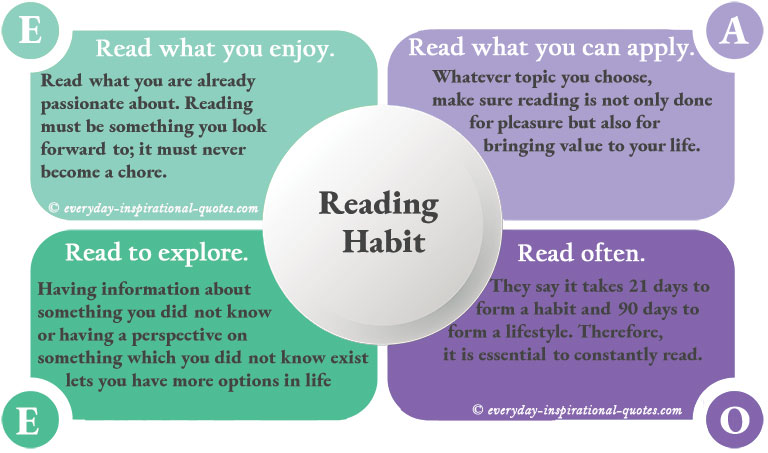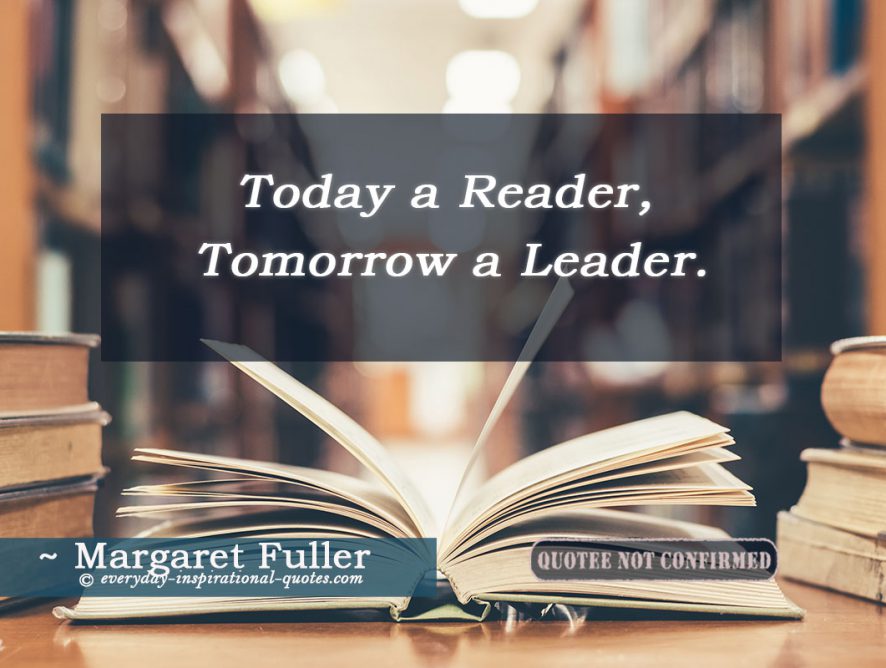“Today a reader, tomorrow a leader” is a quote commonly attributed to Margaret Fuller. However, to date, there has been no confirmation that Fuller wrote or said this. There is however some clues as to who might have actually said this quote and the evidence points towards a certain W. Fussellman, a student at the West Orange Essex County Vocational School for Boys. Fussellman took part in one of his school’s campaign to donate books and send slogans to the Newark Public Library in New Jersey. The library ultimately received 43 slogans, with the quote in question written next to his name.
Although Margaret Fuller was considered one of the most a well-read journalists in New England, research on her works finds little allusion to the idea that leaders are readers. Nevertheless, the idea itself was already widespread, with a 1926 advertisement in an Illinois newspaper containing the phrase, “Leaders are readers.”
There are noble books but one wants the breath of life sometimes.”
Margaret Fuller
One important detail worth noting, an excerpt from Margaret`s letter to Ralph Waldo Emerson, in which she wrote, “There are noble books but one wants the breath of life sometimes.” This implies that while Margaret placed a high degree of importance on reading, she never lost sight of the significance and beauty of life.

Who was Margaret
Margaret Fuller was born in Massachusetts in 1810. At three and a half years old, her father already taught her to read and write, and she was raised to read what was then deemed “masculine” literature, as opposed to the typical literature that women preferred to read.
As a young girl Margaret was not exactly pleased with her strict home schooling, she attributed her early nightmares and sleepwalking episodes to her father’s strictness and high expectations. To illustrate this point, her father found and saved a note she wrote when she was ten, writing that she was “born to sorrow and pain.”
Despite all of these troubles, her passion for reading and literature never waned and she successfully established a career as a writer, translator, and journalist.
What is the Meaning of the Quote?
The quote refers to the belief that people who regularly read, develop themselves to be eventual leaders. There is no limitation on the kind of literature that the quote refers to, and there is no limitation as to the kind of leader. Thus, it may be understood that readers of literature of whatever kind will eventually become leaders, whether of their communities, of the nation, or the world. It is certainly possible that, Margaret`s upbringing was influenced by certain types of literature. However, there is little evidence to back this up.
One thing is certain, is that leaders often get to where they are by continually drawing wisdom from the literature that they have read. Whether it be using lessons from novels or applying lessons from biographies of past authors, leaders always have a trove of knowledge and wisdom that they rely on to move forward. This sets them apart from non-readers, who often rely on more limited sources of information such as their personal experience and perspective to make critical decisions.

The importance of Reading
Reading is said to enrich the mind, and this common adage is with good reason. Aside from the enrichment in vocabulary that comes with literature, the very act of reading exposes the reader to a world far different from theirs.
- Reading allows one to experience a broad range of cultures.
- Some books remain relevant over centuries
- Longer attention span.
In the modern age, traveling to foreign lands is often hailed as one of the best ways to be exposed to the world. The same can be said about reading. In past ages, cross-border travel was reserved only for the elite few and even then the travel was long, uncomfortable and much more prone to risk than it is today. Hence, most people had to resort to other means of exposure, and for many of them, this was done through reading.
One can also find that even classic literature from past centuries contains social commentary that remains relevant today. Works written by the likes of Homer to Shakespeare continue to find applicability in the modern age, and there is much to be said about having one’s worldview of the present being enriched with knowledge from the past. Even better the authors we usually read have at some point in time struggled with some of the same issues that we do today. Hence it would be wise to learn what they had to discover over their lifetime.
Today’s best leaders often have their reading list, and they are often asked for reading recommendations by plenty of their followers. Nowadays, it is common to hear of people who grew up as recreational readers, only to abandon the habit upon reaching their older years. This is significantly exacerbated by the Internet Age, where information is fed to people in small pieces, cultivating a culture of instant gratification.
Being a non-reader has its dangers, as well. Those who have not picked up the habit of reading tend to have short attention spans, creating problems in school and the workplace. Additionally, they are limited only to the knowledge that the modern world gives them. If there is any truth to the saying that knowledge is power, then non-readers will find themselves powerless against the various difficulties of life.
How to cultivate the habit of reading
Whether a person was a former reader or was never one in the first place, the habit of reading can be cultivated, no matter how old one is.

- Read what you enjoy.
- Read what you can apply.
- Read to explore.
- Read often.
One way of getting into the habit of reading is start with literature that already interests you, to begin with. Whether you are into fiction, entertainment, or the news, you must start developing a reading habit on what you are already passionate about Reading must be something you look forward to; it must never become a chore. Society has plenty of tales of former readers who stopped because reading has become something they have to do, instead of something they want to do.
There are individuals who do not enjoy reading fiction because they may not be able to apply it in real life. While this statement in and of itself is debatable, starting out you should definitely try to read books which solve some kind problem that you personally face. It might be a book on strategy, to perhaps make a more efficient use of your time and money or it can be a book on personal development, to overcome the battles you have inside of you. Whatever topic you choose, make sure reading is not only done for pleasure but also for bringing value to your life.
Reading what you enjoy and reading what is practical both build on the premise of what you already know. You either know you enjoy reading something or you know that there is some kind of problem you wish to solve. However, there are plenty of topics and genres which are unknown to you. Having information about something you did not know or having a perspective on something which you did not know exist makes you have more options and thus much more flexible in life. Flexibility is a great power in life, sometimes instead of trying to take your problem head on, you can try to manoeuvre around it thus saving time and resources.
Once you have learned to enjoy reading, it is essential to keep on repeating it. They say it takes 21 days to form a habit and 90 days to form a lifestyle. If a person truly wants to develop a lifestyle, not just a habit, of reading, it is essential to constantly read. However, this idea must be balanced with the notion that reading must never become a chore.

